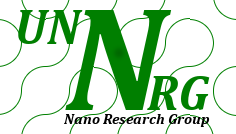Prof. Dr. David Díaz Díaz
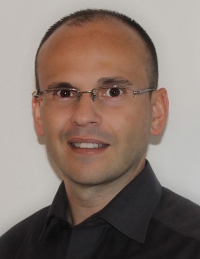 |
David Díaz Díaz was born in 1974 in Tenerife, Canary Islands, in Spain. He studied there and received his PhD in Chemistry from the University of La Laguna under the supervision of Prof. Víctor Martín. His doctoral thesis focused on the synthesis of natural products and the development of new synthetic methodologies using transition metal complexes. In 2002, he joined the group of Prof. M. G. Finn as postdoc at The Scripps Research Institute in California (US), where he also worked in close collaboration with Nobel Laureate Prof. Barry Sharpless. During this period, he specialized on the chemistry of amidines, bioconjugation, click chemistry, functional polymers and soft materials. Since 2006, he has held various positions in academia and industry, including a “Ramón y Cajal” Fellow and Assistant Professor at the Autonomous University of Madrid (Spain), and Sr. Chemist at the American Multinational Chemical Company, Dow Chemical, in Switzerland. In 2010, he became simultaneously a Tenured Scientist at the Spanish National Research Council and an Alexander von Humboldt Experienced Researcher at the University of Regensburg in Germany obtaining a dual affiliation. In 2013, he was awarded with the prestigious Heisenberg Professorship from the German Research Foundation (DFG) and was appointed as Associate Professor at the University of Regensburg. Prof. Díaz is the first Spanish Scientist to be awarded with the Heisenberg Professorship in Germany. Among several international honors and awards, he has received the Young Investigator Award from the Polymer Network Group in Japan. He is also the Editor-in-Chief of the journal Gels and Full Editorial Board Member of ScienceOpen. In 2017, he received Honorary Adjunct Professorship from the University of Jiangsu promoted by the Chinese Advanced Materials Society; Honorary Membership of the Argentine Organic Chemistry Association; Accreditation as University Professor by the National Agency for Quality Assessment and Accreditation of Spain; and the status of Permanent Member (venia legendi) of the Faculty of Chemistry and Pharmacy at the University of Regensburg in Germany. He has about 170 scientific publications and his main research interest focused on the development of functional soft materials for biomedical, catalytic, coating and energy applications. |
Prof. Kenneth Ozoemena
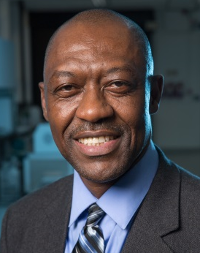 |
Kenneth Ozoemena is Professor of Materials for Energy & Electrochemistry at the University of the Witwatersrand (Wits), South Africa. His current research interests are on materials science and electrochemistry with a focus on advanced materials for the next-generation clean energy technologies (including lithium-ion batteries, lithium-sulfur batteries, sodium-ion batteries, electrochemical capacitors, and fuel cell technologies) as well as the development of smart electrochemical sensors for health and environmental applications. He holds BSc (Hons) from Abia State University, double MSc degrees from the University of Lagos, and a PhD (2003) from Rhodes University. He is a Certified Renewable Energy Professional (CREP) of the Association of Energy Engineers (AEE, USA), Fellow of the African Academy of Sciences (FAAS), Fellow of the Royal Society of Chemistry (FRSC) and member of the Academy of Science of South Africa (ASSAf). Professor Ozoemena has published well over 150 peer-reviewed articles, authored and edited books and book chapters. |
Prof. Ishaq Ahmad
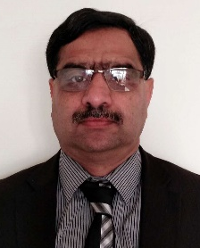 |
Ishaq Ahmad joined National Centre for Physics in 1999 and currently holds the position of Director, Experimental Physics department, National Centre for Physics, Islamabad and adjunct faculty member of Pakistan Institute of Engineering & Applied Sciences (PIEAS), Islamabad. He has co-authored over 80 publications in SCI journals and supervised several Master, PhD and Postdoctoral students. He has number of books and book chapters. His research interests are focused on Ion implantation, radiation induced modification of materials/nanomaterials, synthesis of nanomaterials/thin films and ion beam analysis of materials. He is editorial board member and reviewer of several well know journals. He was TWAS-UNESCO-iThemba LABS research Associate from 2014 to 2016. He obtained his PhD at Graduate University of Chinese Academy of Sciences, China. |
Prof. Enock Dare
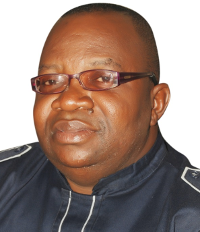 |
Enock Olugbenga Oladepo DARE is presently the first Professor of Nanotechnology in Nigeria. He is a seasoned chemist, distinguished scholar and researcher of high repute. He holds a Ph.D in Chemistry of the University of Ilorin, Nigeria and Advanced Research Diploma in Chemical Engineering of Tokyo Institute of Technology, Japan. A postdoctoral training at Princeton University, NJ, USA. Professor Dare is an outstanding international scholar and widely travelled to all continents of the world through international cooperation, having visited more than 30 different countries. He is a UNESCO and MONBUSHO fellow (Japan); FULBRIGHT and USAMI fellow (Princeton University, USA); Taiwanese National Science Foundation fellow (Taiwan); A regular associate of ICTP, Trieste, Italy e.t.c. To crown it all, he recently got the world most prestigious Alexander von Humboldt (AvH) – Georg Forster fellowship. He is presently AvH fellow, an awardee and a Professor at University of Regensburb, Germany. Prof. Dare is a kingpin of Nanotechnology research in Africa. He remains a major player in the Nigeria Nanotechnology Initiatives of 2006 that brought Nanotechnology into limelight in Nigeria. He has made excellent research output in Hybrid nanocomposites based on POSS, nanoporous membrane technology, transdermal drug delivery, nanobimetallic for sensor and catalysis, green nanotechnology, nanobiotechnology, e.t.c. His most current research lies on “nano-enabled materials for anti-counterfeiting, fingerprinting for criminality detection. Prof. Dare successfully deployed the concept of nanotechnology in translating “discarded waste product via surface nanochemistry to prototype and technology leading to an international “Patent”. The technology has the full capability for petroleum fingerprinting, crude oil/water separation and promotes enhanced oil recovery. Furthermore, he is the brain behind the invention of a point-of-use nanoporous water purification technology that accorded him a national award as the 2nd best at the National Universities Research and Development Fair (NURESDEF 2012) which attracted all Universities in Nigeria. It is worth of note that several other awards, grants and commendations are to his credit. He was “Innovation and Invention” awardee of NASENI. The governing council of the Federal University of Agriculture, Abeokuta commended him “for breaking new grounds in Chemistry” in the year 2014. He is the author/co-author of over 100 scientific publications and has given more than 30 invited lectures (plenary and keynotes) at various conferences world-wide. Professor Dare has produced 8 Doctors (Ph.Ds), some of which has gained tenure at prestigious institutions nationally and internationally. Administratively, he was former Acting Director of Academic Planning, Federal University, Lafia. As well, he was former Head of Department of Chemistry, FUNAAB. |
Prof. Francis Dejene
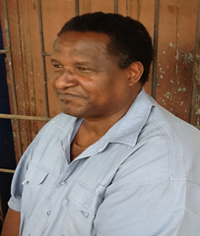 |
Prof. FB Dejene served as a lecturer at both Jomo Kenyatta University of Agriculture and Technology and Kenyatta University between 1994 and 1999. He is currently aprofessor at the department of physics, UFS (Qwa-Qwa Campus). He graduated for his PhD at RAU (currently UJ), where he addressed the incorporation of gallium and sulphur into CuInSe2 thin film, which was systematically investigated with a view to establish a scientific and engineering base for the fabrication of homogenous CuIn(Se,S)2 and Cu(In,Ga)Se2 quaternary alloys with optimum band gap values between 1.1 and 1.2 eV for the utilization in thin film solar cell devices. He demonstrated that quality chalcopyrite thin films can be produced by simple and reproducible processing technology. This fact is supported by the successful fabrication of a 10.2 % efficiency solar cell. The results obtained have advanced our understanding of this important material system and make significant contribution to the basic knowledge required in exploiting and advancing thin film chalcopyrite technology. He is currently involved with several parallel researches, which are on preparation by simple reproducible processes and characterization of new and smart materials for phosphorescence, photovoltaic, sensors, nanoparticles for energy, energy storage and FED applications. He has presented their research group results at different conferences, both locally and internationally. He has developed collaboration with University of the Western Cape, Nelson Mandela Metropolitan University, University of Nairobi, University of Eldoret, JKUAT Physics, University of Addis Ababa, Tokyo Institute of Science and Technology, ICTP and Tsukuba University. |
Prof. Deji Akinwade
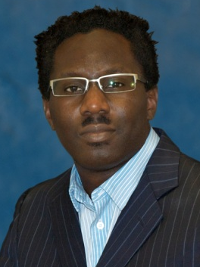 |
Dr. Deji Akinwande is a Fellow of the American Physical Society (APS). He received the PhD degree in Electrical Engineering from Stanford University in 2009, where he conducted research on the synthesis, device physics, and circuit applications of carbon nanotubes and graphene. His Master’s research in Applied Physics at Case Western Reserve University pioneered the design and development of near-field microwave probe tips for nondestructive imaging and studies of materials. He is the David & Doris Lybarger Endowed Faculty Fellow and Associate Professor at the University of Texas at Austin. Prof. Akinwande has been honored with the 2017 Bessel-Humboldt Research Award, the U.S Presidential PECASE award, the inaugural Gordon Moore Inventor Fellow award, the inaugural IEEE Nano Geim and Novoselov Graphene Prize, the IEEE “Early Career Award” in Nanotechnology, the NSF CAREER award, several DoD Young Investigator awards, the 3M Nontenured Faculty Award, and was a past recipient of fellowships from the Kilby/TI, Ford Foundation, Alfred P. Sloan Foundation, and Stanford DARE Initiative. His recent results on silicene have been featured by nature news, Time magazine and was selected among the top 2015 science stories by Discover magazine. His work on flexible 2D electronics was highlighted among the “best of 2012” by the nanotechweb news portal and has been featured on MIT’s technology review and other technical media outlets. He is a distinguished lecturer of the IEEE Electron Device Society and an Editor for the IEEE Electron Device Letters and Nature NPJ 2D Materials and Applications. He co-authored a textbook on carbon nanotubes and graphene device physics by Cambridge University Press, 2011, and was recently a finalist for the Regents’ Outstanding Teaching Award, the highest teaching award from the University of Texas System. |
Prof. Emmanuel Iwuoha
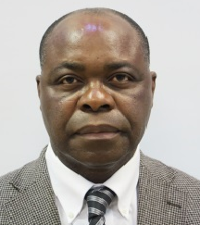 |
Emmanuel Iwuoha is the South African Research Chair Initiative (SARChI) Chair (Tier 1) for NanoElectrochemistry and Sensor Technology and a Senior (Distinguished) Professor of Chemistry at the University of Western Cape (UWC). He received the University of Western Cape Vice Chancellor’s Distinguished Researcher Award for 2015. He was a finalist in the 18th National Science and Technology Forum (NSTF)-SOUTH 32 AWARDS 2015/16 which recognises excellence within the science, engineering, technology and innovation (SETI) community. Prof Iwuoha is an electrochemist whose research work relates to the designing and production of smart materials (polymeric, dendritic and graphenated composite systems; as well as, multi-metal nanoalloys and chalcogenide quantum dots) for application in sensors, electroanalysis and energy-generating systems. He is the Founder and Director of SensorLab™ (UWC Sensor Research Laboratories) since 2002, and the research centre’s team comprised 8 Academic staff, 7 Postdoctoral Fellows, 34 PhDs and 20 MSc in 2017. Prof Iwuoha has supervised 51 PhD and 52 MSc graduates. He has more than 239 ISI-cited journal publications, book and encyclopaedia chapters. In addition, he is currently in the editorial board of Bioelectrochemistry, the official journal of the Bioelectrochemical Society, served in the editorial board of several journals and recently was a Special Issue Editor of Journal of Nano Research Volume 44 (2016) on “Nanomaterials for electrocatalysis and electrochemical energy applications“. Among many others, Prof Iwuoha has gave Plenary Lectures at the 1995 Heyrovsky Discussions, Prague; the 4th World Biosensor Congress of 1996 in Bangkok; the Caribbean Conference of Chemistry and Chemical Engineering of 2001 in Havana, Cuba; the 5th Southern and Eastern African Network of Analytical Chemist Conference (SEANAC 2014), Mombasa, Kenya, 9–13 June, 2014; and the 81st Prague Meeting on Macromolecules (81 PMM): Polymer Optoelectronic, 20-14 September 2017, Prague, Czech Republic. Some recent Keynote Presentations he made include Electrochem 2015, Durham, UK, 13-15 September 2015; and the 16th International Conference on Electroanalysis (ESEAC 2016), Bath, UK, 12-16 June 2016; the 14th Topical Meeting of the International Society of Electrochemistry, Nanjing, China, 29 March-1 April 2014; International Conference on Polymer Composites (ICPC-2014), Surathkal, Mangalore, India, 19-20 December, 2014); and the 7th International Symposium on Macro- and Supra-molecular Architectures and Materials (MAM-2014), 23-27 November 2014, Johannesburg, South Africa. |
Prof. Justus Ndukaife
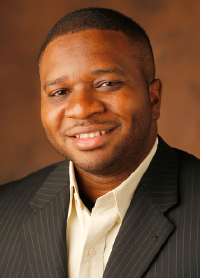 |
Professor Justus Ndukaife is with the department of electrical engineering and computer science at Vanderbilt University. He is also a faculty member of the Vanderbilt Institute of Nanoscale Science and Engineering (VINSE). Prior to joining Vanderbilt University, he received a Ph.D. in electrical engineering from Purdue University during which he was awarded the prestigious Dimitris N. Chorafas Foundation Award for outstanding Ph.D. dissertation, an award given to the best doctoral candidate at Purdue University every year. He was recognized for his invention of a new kind of Lab-on-a-Chip device called Electrothermoplasmonic Tweezers for high resolution trapping of nanoscale objects. His other honors include the Purdue College of Engineering Outstanding Research Award, the NSBE Golden Torch Award, Best Paper Award at the American Society of Mechanical Engineers (ASME) conference, election as co-chair of the 2018 Gordon Research Seminar on Plasmonics and Nanophotonics, and Induction into the Society of Innovators of Northwest, Indiana, USA. During the 2016 Gordon Research Conference on Plasmonics and Nanophotonics, he was selected to deliver the late-breaking talk and his presentation was entitled “Shaping the Future of Plasmon Nano-Optical Tweezing”. His research works have been published in the top peer-reviewed journals including Nature Nanotechnology, Science and ACS Nano. He received the bachelor of science degree from the University of Lagos, Nigeria with First Class honors in the department of Electrical and Computer Engineering. Professor Ndukaife’s research is at the interface between the fields of nanophotonics (which involves the confinement and manipulation of light at the deeply subwavelength scale) and microfluidics, as well as on novel bio-inspired soft actuators and robots. Professor Ndukaife’s research interests include nano-optical trapping with plasmonic and resonant dielectric metasurfaces, programmable self-assembly of nanostructures for energy harvesting and on-chip light sources, discovery of novel emergent behavior in nanoscale motors, and nano-biosensors for water quality monitoring and point-of-care diagnostics. |
Dr. Katlego Makgopa
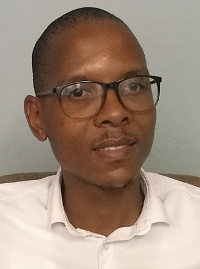 |
Dr. Katlego Makgopa attended secondary school at Phusela High School, Lenyenye (Limpopo). He obtained a BSc degree, Chemistry and Biochemistry as majors, at University of Limpopo, Turfloop Campus, Polokwane and BSc (Hons) in Chemistry at University of Pretoria, Pretoria (Gauteng). He commenced MSc in 2010 and PhD in 2012, at University of Pretoria, Chemistry Department, and both studies focused on the Electrochemistry of Energy Storage Materials for application in Supercapacitors. He started Postdoctoral study at the University of Pretoria after completing his PhD in July-2016, where he focused on the synthesis of metal-free carbon-based catalysts for the reduction of CO2 into liquid fuels, and ended in February-2017. He briefly worked as a Senior Lecturer at University of Limpopo before his full-time employment at Tshwane University of Technology in May-2017 as a Physical Chemistry Lecturer at Chemistry Department, Arcadia Campus, Pretoria. He has published his research output at various internationally peer-reviewed journals as both articles, book chapters, and presented his work at various conferences. His current research interest is in the area of materials science, energy storage, renewable energy and nanotechnology, focusing mainly on the electrochemistry of nanostructured materials such as nanostructures of carbons (e.g., OLCs, CNTs, Graphene, GO, AC), transition metal oxides (e.g., MnO2, Mn3O4, NiO) and redox-active N4-macrocyclic metal complexes (e.g., metallophthalocyanines, NiTAPc) with a view of establishing their potential applications in the development of electrochemical energy storage (i.e., electrochemical capacitors, and lithium-ion batteries) and conversion (i.e., fuel cells) systems. He has experience in employing a multi-disciplinary approach to materials characterization, which draws from a repertoire of sophisticated techniques that includes advanced electrochemistry and microscopic/spectroscopic techniques. He has promoted one BTech student in 2017 and currently supervising and co-supervising six MSc students. |
Prof. Rajan Jose
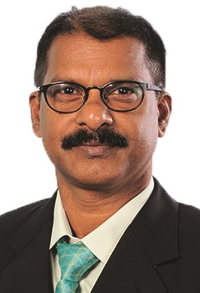 |
Professor Rajan Jose is currently the Dean of Research (Technology), a member of Senate, and a Senior Professor at the Universiti Malaysia Pahang (UMP). He supervises the Nanostructured Renewable Energy Materials Laboratory in the UMP. He investigated nanostructured perovskite ceramics for microwave and superconducting electronics during doctoral research at the Council of Scientific and Industrial Research (CSIR), Trivandrum, India and received PhD degree in the year 2002 for his work on superconducting and microwave electronics. He was employed as a scientist at the Indira Gandhi Centre for Atomic Research (India), AIST (Japan), Toyota Technological Institute (Japan), and the National University of Singapore (Singapore) before joining UMP. He has published over 160 papers in Web of Science (Thomson Reuters) indexed journals which are cited nearly 6400 times with an h-index of 43. He holds over 21 patents nationally and internationally. His current research interests include nanostructured materials and renewable energy devices. |
Prof. M.V. Reddy
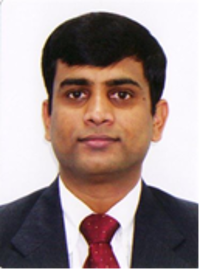 |
Dr. M.V. Reddy obtained his Ph. D (2003) in the area of Materials Science from ICMCB-CNRS)/ENSCPB, University of Bordeaux, France. From July 2003, he is working in National University of Singapore (NUS), Singapore. For the last 15 years, he has been working on the nano/submicron sized materials for Li-ion battery materials (cathodes, anodes, supercapacitors and solid electrolytes), including novel methods of synthesis, characterization and evaluation of the electrochemical properties. He has published around 163 papers in various international journal (http://scholar.google.com.sg/citations?user=pWKr2M0AAAAJ&hl=en) and gave 70 talks (Plenary (10), keynote (10) and Invited talks (38) and 16 contributed talks) at various conferences. His h-index; 50 and 9500 citations. Reddy is one of the top 1% highly cited scientists (data from InCites, Thomson Reuters) and According to Field-Weighted Citation Impact (FWCI) data base listed #256 out of 500 authors worldwide (based on number of publications) under electrochemistry and according to publications in top 10%, I am ranking no. #37 and ranked no 1 on the molten salt synthesis. He authored a landmark publication on electrode materials for lithium-ion batteries and their reaction mechanisms that appeared in Chemical Reviews (impact factor 47; the paper has been cited over 1550 times since July. 2013). He is serving as editorial advisory board member in “Materials Research Bulletin” and several open access Journals, and he served as theme chair for Energy and Environment and session chair for Batteries, Fuel cells and materials for Environmental protection in International Conference of Young Researchers on Advanced Materials (ICYRAM-IUMRS) 2012, Singapore. He trained more than 250 local high school/college and International exchange students and 9 Ph.D students. His projects won many awards in national and international conferences and his project won 2nd prize in prestigious Intel International Science &Engg. Fair (ISEF 2013) and 1st prize from American Chemical Society, USA. He won Outstanding Science Mentorship Award (2010, 2011, 2012 & 2013, 2014, 2015, 2016), from Ministry of Education, Singapore and Inspiring Research Mentor Award (2011, 2012, 2013, 2014, 2015, 2016 & 2017) from NUSHS. He is visiting professor and serving as a Ph.D thesis examiner for various universities. Research Interests: Nanotechnology; Energy storage materials: Li-ion batteries; supercapacitors; Advanced functional materials. |
Prof. Uchechukwu U. Nwodo
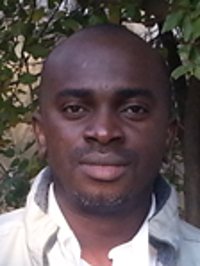 |
Professor Nwodo is currently the Head, Department of Biochemistry and Microbiology, University of Fort Hare, Alice, South Africa. He holds a PhD in Microbiology from the University of Fort Hare and, an MSc (Medical Virology) and BSc (combined Honours; Microbiology/Biochemistry) respectively from the University of Nigeria, Nsukka. In 2013, he served as a postdoctoral research fellow in the Department of Biochemistry and Microbiology, University of Fort Hare for one year prior to his appointment as a faculty member. Professor Nwodo likewise hold other certificates in Bioentrepreneurship, Bioinformatics, Biotechnology and Molecular biology and Laboratory safety techniques from notable institutions. Professor Nwodo is an NRF rated (Y2) researcher and in 2016, he was a recipient of the Vice Chancellor’s Emerging Researcher award for the Faculty of Science and Agriculture, University of Fort Hare. And, from the international sphere, he served as a visiting Professor at the University of Tübingen, Germany (2016). He’s been recognised with prestigious awards for emerging and young scientists some of which includes the competitive German Research Foundation (Deutsche Forschungsgemeinschaft)/ the World Academy of Science (TWAS) Cooperation Visit for Scientists (2016), the Royal Society for Tropical Medicine and Hygiene award (2015), the Biovision/TWAS Alexandria, Egypt Award (2013 – 2015), Biovision/TWAS Lyon France Award (2014 – 2015) respectively, and the Federation for European Microbiological Society (FEMS) Young Affiliate Award, Leipzig, Germany (2013). Professor Nwodo has to his credit one hundred and thirty five (135) publications comprising of sixty (60) peer-reviewed journal articles published in (ISI and Thomson-Reuters indexed) high impact factored journals, thirty five (35) international and national conference proceedings and forty (40) nucleotide sequences. His research focuses on the bio-molecules of added value, disease and antibiotic resistance determinants and natural product chemistry thematic areas. Some of Professor Nwodo’s active research collaborations are with the Gene Ecology Research Institute, University of Tromso, Eberhard Karls University, Tübingen, Germany, University of Cairo, Egypt, University of Ottawa, Canada, Universitaire El Manar, Tunisie, Tunisia and Tanzania Industrial Research and Development Organization, Tanzania. Professor Nwodo has enjoyed immense funding support from the ESKOM power utility company of South Africa (TESP-ESKOM), the National Research Foundation of South Africa (NRF), the Technology Innovation Agency of South Africa (TIA), the South African Medical Research Council (SAMRC), German Research Foundation (DFG), the Royal Society for Tropical Medicine and Hygiene and the Govan Mbeki Research and Development Centre (GMRDC). Conclusively, Professor Nwodo is blessed with a beautiful and an amiable wife, a son and a daughter. Their love and support gives him ambient psychological balance for optimum work performance. |
Prof. Velumani Subramaniam
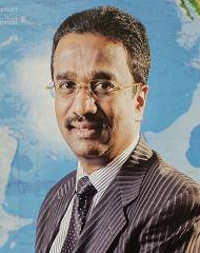 |
Prof. Velumani Subramaniam received Ph.D. in Thin Film Physics from Bharathiar University in the year 1998. Employed as Lecturer/Assistant Professor in the Department of Physics, Coimbatore Institute of Technology from 1986 to 2001. Worked as a Postdoc & Researcher in Solar-Hydrogen Fuel cell group in UNAM, Temixco and Mexican Petroleum Research center from 2001 to 2005. Later joined as Research Professor and Co-ordinator in the Materials Science group of Physics Department in ITESM, Monterey, Mexico. From 2008, working as full time Research Professor in the Electronics and Solid State Section of Electrical Engineering Department at CINVESTAV-IPN, Mexico. Recently won mega project of about 27 Million MN Pesos for the construction of water treatment plant using solar energy and nanomaterials. In 2009 won a very prestigious project to set up National Laboratory for microscope now named as “Laboratorio Avanzado de Nanoscopia Electronica” with an investment of about 55 Million MN Pesos and served as coordinator till Dec 2013. During the period 2009 to 2015 won various projects from CONACyT, European Union, Mexican industries related to bismuth Vanadate, Au:Fe3O4 core shell for medical application etc. Recently participating as executive committee member in the Coordination for Innovation, in the prestigious Mexican Government initiative on “Centro Mexicano de Innovación en Energía Solar (CEMIE-Sol).” Served as coordinator for international relations from 2008 to 2013. So far published more than 140 research articles in leading peer reviewed international journals with more than 1500 citations and have more than 300 conference presentations. Served as guest editor for about 11 special volumes of various journals published by Elsevier, Springer and TransTech etc. Presently serving as editorial board member in the journals Materials Science in Semiconductor processing, an Elsevier journal. Delivered more than 30 invited/plenary lectures in various international conferences around the world. Guided about 12 undergraduate thesis, 14 postgraduate (Masters) thesis and about 10 PhD student, and seven (8) students are pursuing their PhD under his guidance on various topics. Topics of research Collaboration/interest are:
|
Dr. Solomon Nwaka
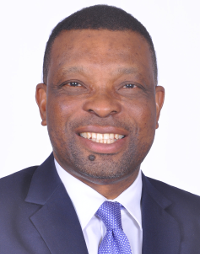 |
Solomon Nwaka’s scientific and leadership career spans various academic, public and international organizations, biotechnology industry, and public-private partnerships in several countries, including USA, Canada, Germany, Japan, Belgium, Italy, Switzerland, Ethiopia, and Nigeria. Presently, he is the founding Executive Director of ANDI – African network for drugs and Diagnostics Innovation at United Nations in Addis Ababa. He headed various R&D units and championed several initiatives, including ANDI, at the WHO’s Special Programme for Research and Training in Tropical Diseases in Geneva, Switzerland. He also served as Scientific Officer/Director for Drug Discovery and Innovation at the Medicines for Malaria Venture in Geneva. He has published extensively, and has received a number of awards and fellowships. He is a fellow of the African Academy of Sciences. |
Prof. Victoria Jideani
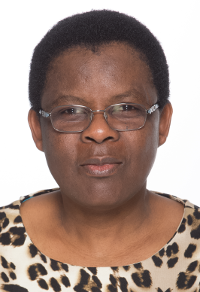 |
Professor Victoria Jideani, possesses a BSc. honours degree in Food Science and Technology from the University of Ife (now Obafemi Awolowo University), Ile-Ife, Nigeria (1983); MSc. degree (1993) in Food Science from the University of Leeds, Britain; a Diploma in Computer Applications from the Women Technology Centre, Leeds, Britain in 1994 and PhD in Food Microbiology at the Abubakar Tafawa Balewa University (ATBU), Bauchi, Nigeria (2001). Professor Jideani is the Founder and Leader of the Cereals and Legumes Biopolymers Research for Food Security (CLBRFS) group at CPUT (https://sites.google.com/site/clbrfs0814/). Our focus is on value addition to African indigenous climate-smart grains and seeds, a means for Africa achieving food and nutrition security. Victoria has two registered patents and over 70 publications in both international and regional peer-reviewed journals, conference proceedings and books/book chapters. She is internationally recognized for her research contribution in cereal science, food processing, food product development, optimization and modeling of food processes. She is a professional member of the following professional bodies:
(1) Professional Natural Scientist, South Africa from 2010; |
Prof. Anthony A. Attama
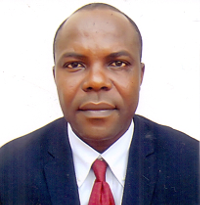 |
Anthony Amaechi Attama is a professor of Pharmaceutics and the Director, Education Innovation Unit (Vice Chancellor’s Office) University of Nigeria, Nsukka. He is the Coordinator of Drug Delivery and Nanomedicines Research Group at the University of Nigeria. Prof. Attama was at the Institut für Pharmazeutische Technologie, Technische Universität Carolo-Wilhelmina zu Braunschweig, Germany for his postdoctoral research in pharmaceutical nanotechnology sponsored by Alexander von Humboldt Foundation, Germany. Prof. Attama was a Visiting Professor at the Laboratory of Membrane and Liposome Research, Department of Biochemistry and Molecular Biology, Institute for Medical Research Israel-Canada (IMRIC), Hadassah Medical School, Hebrew University of Jerusalem, Israel (February to April 2018). He has researched extensively on lipid drug delivery systems- micro and nanomedicines using natural and biocompatible lipids. His research interests include among others, development and formulation of novel delivery systems (e.g. micro/nano systems) of bioactive agents for the control of tropical diseases. He collaborates with renowned scientists within and outside Nigeria. Prof. Attama has won many research and travel grants, and has attended many scientific conferences and workshops. He supervises postgraduate students in pharmaceutical sciences and has many research articles published in peer-reviewed high impact journals. In a bid to translate research results to products, he has fostered the establishment of some pharmaceutical industries in Nigeria and also serves as a consultant to many pharmaceutical companies. Prof. Attama is a registered pharmacist and a Federal Government licenced drug analyst. |
Dr. Mesfin Kebede
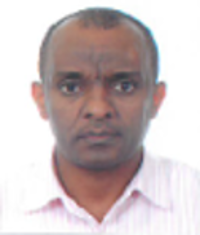 |
Mesfin Kebede has completed his PhD in 2009 in Materials Science and Engineering from Inha University South Korea. He is currently a senior researcher at CSIR. He has been studying and researching nanostructured materials properties and applications as electrodes for lithium ion battery, gas sensor, luminescent and photoluminescence, photocatalysis for almost a decade. He has been supervising and mentoring MSc and PhD students research projects. He has authored 2 book chapters and more than 44 papers in reputed journals with h-index of 12 and has been serving as reviewer for several high impact journals and he also serves as editorial board member. |
Dr. Chinedu Ekuma
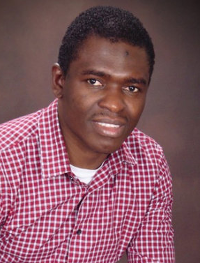 |
Chinedu Ekuma is a Research Fellow at the U.S. Army Research Laboratory, Adelphi, MD. Dr. Ekuma’s research focuses on using density functional theory and various many-body approaches to design and study materials with the goal
(1) to discover new materials with significantly useful technological applications; Of particular interest are promising materials for spintronic, energy-efficient, energy-conversion (photovoltaic, thermoelectric), and energy-storage applications and in advancing our knowledge on the decades-old problem of electron localization, where he pioneered the development of a first-principles-based approach that he currently applies to explore the role of atomic defects in materials. |
Dr. Muhammad Ashfaq Ahmad
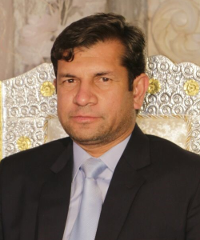 |
Dr. Muhammad Ashfaq Ahmad graduated in Physics from University of Agricultural, Faisalabad; and obtained his PhD from the Harbin Institute of Technology, China. He has been a member of COMSATS faculty since 2002 when he joined as a Research Associate to work on Fuel Cell Technology. Currently, he leads the Quantum, Optoelectronic and Photonic Devices (QOPD) Research group and have established a synthesis lab equipped with fume hoods, wet benches, glove box with nitrogen/Argon supply, hot plates, centrifuges, ovens, furnaces, solar cells sealer, driller and a characterization housing AFM, UV-Vis NIR spectrometer, Raman & PL Setup. The research facilities mentioned above have been established through wining research projects mainly from COMSASTS and Higher Education Commission (HEC) whereas as few more Research projects on synthesis of Optoelectronic/Energy devices (Solar Cells, Fuel Cells) are submitted to strengthen and enhance research facilities to boost the research area. Dr. Ahmad’s future vision for research aims at developing novel and low cost semiconductor materials for energy devices and sensing applications; and a fully equipped Photovoltaic research Lab at Physics Department, CIIT Lahore in particular. His research inclination mainly focuses on composite semiconductor materials and Graphene oxide; and probing if their optoelectronic properties is well suited for modern device applications. |
Prof. Khan Rauf
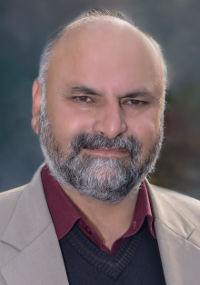 |
Muhammad Abdul Rauf Khan is an associate Professor at the University of Azad Jammu and Kashmir, Muzaffarabad, Pakistan. He is also the Director, High Tech. Centralized Instrumentation Lab, The University of Azad Jammu and Kashmir Muzaffarabad. He has been conducting research on thin film, semi-conducting and solid state materials; since his M.Sc. studies. Currerntly, he specializes on the fabrication and characterization of Organic Light-Emitting Diodes (OLEDs). He obtained his PhD degree from Shanghai University, China. His research interests include:
|
Prof. E.D. Dikio
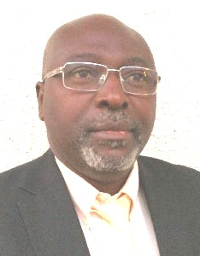 |
Ezekiel Dixon Dikio is a Professor of Physical and Material Chemistry at Vaal University of Technology, Vanderbijlpark South Africa. Prof Ezekiel D. Dikio obtained his PhD from North West University, Mafikeng, South Africa. He has lectured at North West University Mafikeng South Africa, Birla Institute of Technology, Dubai UAE and is currently at Vaal University of Technology. He has over eighty publications in peer reviewed journals. His research interest is in the area of Thermodynamics of Binary and Ternary solution systems and Material Chemistry (Synthesis, Characterization, Electrochemical and Adsorption studies of Carbon Nanotubes, Graphene, Metal Organic Frameworks and Layered Double Hydroxides). |
Prof. Martin O. Onani
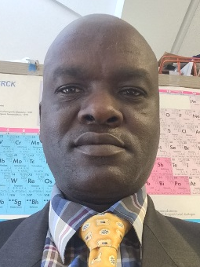 |
Prof Martin O. Onani is an associate professor of inorganic chemistry and nanochemistry at the University of the Western Cape, Cape Town South Africa. He supervises PhD and MSc candidates for both inorganic and nanochemistry in the area of HIV/AIDS, tuberculosis, diabetes, and cancer in South Africa. He is the chemist for the DST/Mintek NIC Biolabels Platform, which is basically tasked with the development of diagnostic and therapeutic nanotechnology-based systems. This is a South African national initiative in nanotechnology started over 10 years ago. He has served as a lecturer at both the Jomo Kenyata University of Agriculture and Technology, Kenya and Walter Sisulu University of Technology and Science, South Africa. He holds BSc (Hons) from Kenyatta University, Kenya, MSc Kenyatta University and PhD in the then University of Natal, South Africa. He is a member of the South African Chemical Institute, African Academy of Sciences (FAAS), Fellow of the Royal Society of Chemistry (MRSC) and member of the Academy of Science of South Africa (ASSAf). Asso. Professor Onani has published well over 70 peer-reviewed articles. |
Dr. Kingsley O. Obodo
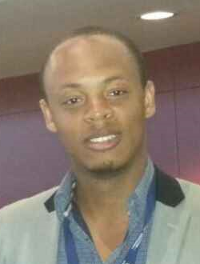 |
Kingsley Onyebuchi Obodo is a Research Fellow in the Department of Physics at the University of South Africa where he has been a member of the High Performance computing group since 2016. He holds the Research Chair Fellowship. Kingsley completed his Ph.D. at the University of Pretoria, his MSc. at the African University of Science and Technology Abuja and his undergraduate studies at Nnamdi Azikiwe University Awka. His research interests lie in the following areas:
Kingsley is a highly cited author with numerous scientific publications. He currently is a member of the Professional Physicist in South Africa. He also contributes to scientific citizenship as a reviewer. He has collaborated actively with researchers in several countries and University on condensed matter physics and material science problems. |
Engr. (Dr.) Emeka Okwuosa
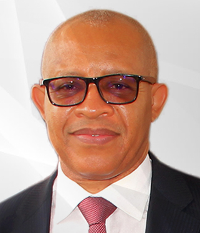 |
Emeka Okwuosa is a seasoned engineer, administrator, entrepreneur and a visionary with over 35 years of experience in the following areas: maintenance and operations, teaching, wireline logging and interpretation, seismic acquisition, processing and interpretation, pipeline engineering, procurement and construction (EPCIC), project management, drilling and drilling services. Some of these activities span Europe, North Africa, West Africa, Gulf of Guinea/Central Africa and Indonesia.
Emeka worked in various capacities for Schlumberger in positions that spanned Field Engineer to Technical Manager in the following parts of the World; Europe (Pau, France, Scotland), North Africa (Libya), West Africa (Mauritania, Senegal, Cote D’Ivoire, Ghana), Gulf of Guinea/Central Africa (Nigeria, Benin Republic, Cameroun, Gabon, Congo and Angola) and Indonesia. He is passionate about development of human capacity in high technology areas of Oil and Gas Industry. This is being achieved via various schemes that have been instituted through the companies that he has founded and runs. Together with other key practitioners in the Oil and Gas Engineering, Exploration and Production sectors, Emeka was instrumental to the enactment of Oil and Gas Local Content Law three years ago. This Law has helped to institutionalize the development of sustainable local capacity in the Oil & Gas industry. Emeka is the founder and CEO of Oilserv Group of Companies. He is a COREN (Council for the Regulation of Engineering) registered engineer, and a member of the following Professional bodies:
|
Prof. Eno E. Ebenso
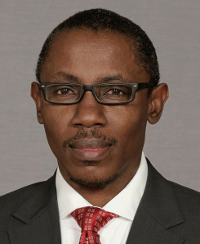 |
Prof. Ebenso obtained his PhD in Physical Chemistry from the University of Calabar, Nigeria . His area of research is Physical Chemistry, Contemporary material science and quantum chemical modelling. He has published extensively in local and international peer-reviewed journals of wide readership with more than two hundred (200) publications (articles in newspapers, plenary/ invited lectures and conference proceedings not included). He has been a Visiting Scholar at Jawaharlal Nehru Centre for Advanced Scientific Research (JNCASR), Bangalore, India (1999), Institute of Organic Chemistry and Biochemistry, Universidad des Saarlandes, Saarbrucken, Germany (1999 -2000) and the Technical University of Darmstadt, Germany (2006) through Third World Academy of Sciences (TWAS) (1999) and German Academic Exchange Services (DAAD) (1999-2000, 2006) Fellowships, respectively. Presently, he holds a Visiting Scientist Fellowship (2008 till date) from the Scientific Research Programme Fellowship of Turkey (TUBITAK) tenable at the Department of Chemistry, Kocaeli University, 41380, Izmit, Turkey. He has also been awarded and cited in: (a) Marquis WHO’S WHO in American Education (2003/2004, 2006/2007) (b) Marquis WHO’S WHO in Science and Engineering (2006) and (c) Marquis WHO’S WHO IN THE WORLD (2006).He has been nominated for the: (a) 21st Century Award for Achievement in Chemistry – International Biographical Centre, Cambridge. (2003); (b) 2000 Outstanding Intellectuals of the 21st century – International Biographical Centre, Cambridge and (c) International Scientist of the year 2010 by the International Biographical Centre, Cambridge.He is a reviewer for more than thirty (30) journals in Chemistry and material science. He is a member of the Chemical Society of Nigeria (MCSN), American Chemical Society (MACS), New York Academy of Sciences, National Geographical Society, Nigerian Corrosion Society, Society for the Advancement of Electrochemical Science & Technology (SAEST), International Society of Electrochemistry, International Association of Physical Chemists, Chemical Society of Ethiopia, South African Chemical Institute (M.S.A. Chem. I.) and South African Council for Natural Scientific Professions (SACNASP) and many other scientific professional bodies. He is a fellow of the Royal Society of Chemistry, UK. He is a member of Academy of Science of South Africa (ASSAf). Presently, Prof Ebenso is the Executive Dean of the Faculty of Natural and Agricultural Sciences at the North-West University. He also leads research in the Material Science Innovation and Modelling Research Focus Area at the North-West University. ESTABLISHED NRF RESEARCHER IN CHEMISTRY (SOUTH AFRICAN NRF) – B3 RATING CATEGORY. CURRENTLY THIRD MOST PROLIFIC AUTHOR IN CORROSION INHIBITION RESEARCH BY SCOPUS SEARCH ENGINE WITH AN H-INDEX OF 47 FROM OVER 7000 CITATIONS. |
Prof. Aziz Amine
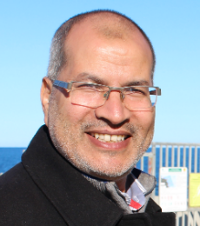 |
Prof. Aziz Amine is a professor of Biochemistry in the Faculty of Sciences and Techniques, Hassan II University of Casablanca, Morocco. He obtained a Ph.D. in 1993, from the Free University of Brussels. His research interests are focused on the following areas:
Prof. Amine is the Chair of the International Workshop “Biosensors for Food Safety and Environmental Monitoring” organized every two years in Morocco (www.biocap.ma). He is a reviewer for several scientific international journals, as well as the Editor of Biosensors & Bioelectronics journal (IF 7.8). |
Prof. Afam I.O. Jideani
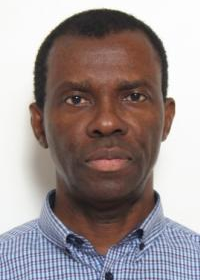 |
Afam is a professor of Food Science and Technology (FST) at the University of Venda (Univen), South Africa where he is also the Partnerships & Internationalisation Champion: School (Faculty) of Agriculture. He obtained his PhD from the University of Leeds, UK in 1994 and postdoctoral fellowship in Kagoshima, Japan in 1995. He became full professor in 1999 before taking up Director of Research and Development at the National Food Technology Research Centre Botswana (2006). As a National Research Foundation (South Africa) rated scientist, he has supervised and mentored several postgraduate students three of whom are now full professors in FST. His research in FST has focused on plant foods. With over 130 publications in scientific journals, book, book chapters and conference proceedings; he is the leader of the Plant Food Processing for Bio-economy research group at Univen. The group’s research focuses on processing and technology of plant foods in the following but not exhaustive areas: survey of plant-based indigenous foods and knowledge systems, value addition to indigenous plant-based foods for food security, functional food ingredients in food systems and food biotechnology. He is a fellow of the Nigerian Institute of Food Science and Technology. He is also a professional member of the following scientific bodies:
|
Prof. Omotayo Arotiba
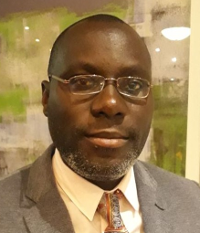 |
Omotayo Arotiba completed his PhD (2008) in physical chemistry (Electrochemistry speciality) with scholarship from the National Research Foundation South Africa at SensorLab, Department of Chemistry, University of the Western Cape. He carried out some postdoctoral research from 2009 to 2010 at SensorLab, Department of Chemical Engineering, University of Cape Town and the University of Johannesburg (supported by the Claude Leone Foundation Postdoctoral Scholarship 2010). He joined the Department of Applied Chemistry, University of Johannesburg (UJ) in 2011 where he is currently a full Professor and the Director of the Centre for Nanomaterials Science Research. He is the pioneer and leader of the Electrochemistry Research Group at UJ and also the current Chairman of the Electrochemistry Division (ElectrochemSA) of the South African Chemical Institute (SACI).
His research interest is on the application of electrochemistry to solving challenges in environmental, water, materials and biomedical fields. His focus includes (but not limited to) the development of electrochemical sensors & biosensors; photo-electrochemical water treatment technologies; materials electrochemistry and nano-electrochemistry. |
Dr. G.H. Jain
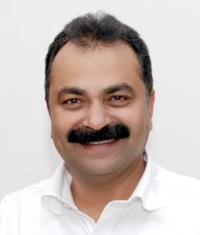 |
Dr. Gotan Hiralal Jain is the Principal at S.N.J.B.’s K.K.H.A. Arts, S.M.G.L. Commerce and S.P.H.J. Science College, Chandwad, India. He completed his Ph.D. on Gas Sensors in 2007. His areas of research are thin and thick films gas sensors, synthesis of nanomaterials by various techniques for gas sensor applications. He has delivered talks at various National and International conferences, few of them are: ICST-2007, Massey University, New Zealand, MS&T-2008, Pittsburgh, USA, EUOROMAT-2009, Glasgow, Scotland, UK, MINM-2010, CMRD Institute, Cairo, Egypt, ICST-2011, Palmerston North, New Zealand and ICPAC-2012, Mauritius, Trinity College, Dublin and Stoney Brooke University, Long Island, USA-2015. He also presented research papers at MRS-2013, Adis Ababa, Ethiopia and at University of Nigeria, Nsuka. His talk has been appreciated in ICST-2010 and ICST-2011 New Zealand and Italy respectively. He has published around 70 papers in peer-reviewed international journals, won 5 awards for oral/poster presentations in various national/international symposia. His two reference books are published by Lambert Publishing House, Germany. He has contributed chapters in book series published by Springer-Verlag. Eight students are working under his supervision for Ph.D. degree, six awarded Ph.D. degree, and for six he is working as a Co-guide. He is a reviewer for various international referred journals of Elsevier and Springer. He is honored by University of Pune as a ‘BEST Teacher’ for his contribution in research. He is nominated for BHASKAR RAI award, given by Indian Physics Teachers Association. Recently he is awarded as an ‘Ideal Teacher’ in the University of Pune region by the Government of Maharashtra with the hands of Governor of state. |
Prof. CMI Okoye
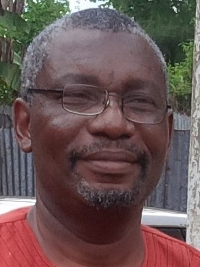 |
Prof. Chukwuemeka Madubuko Ijeoma Okoye received his academic training at the University of Nigeria. He joined the services of the University in March 1988. He has served the University as Head of Department, Associate Dean and Dean of Faculty as well as in several other ad hoc and statutory committees.
His research interest is primarily in the field of theoretical solid state physics especially in the areas of lattice dynamics, superconductivity and electronic structure studies. He has published in reputable international and local journals. He has also benefited from some academic fellowships and attended several conferences, schools and workshops that have provided quality academic exposure both locally and internationally. Prof. Okoye is married with children. |
